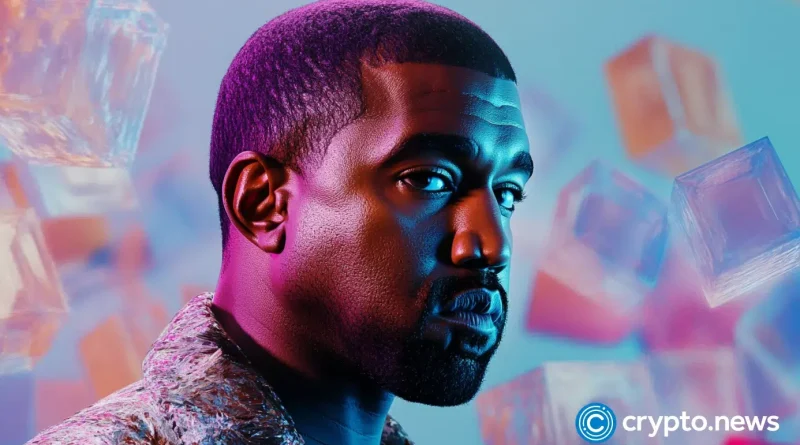The Increase in Racist Meme Coins: What You Should Be Aware Of
The world of cryptocurrency is known for its viral and community-driven projects, but the emergence of racist meme coins has sparked discussions about the boundaries of decentralization.
This topic is under the spotlight again after rapper Kanye West, now known as “Ye,” revealed plans to create a so-called “Swasticoin” through a series of contentious social media messages.
West’s comments, which contained antisemitic comments regarding the Jewish community, signal a departure from his earlier criticism of celebrity-backed coins that exploit their fans.
On Saturday, West appeared to change his position.
“I’m going to open the CA [contract address] for my Swasticoin to Jewish people and my friends and family first,” he stated. In conjunction with this announcement, the “Jesus Walks” artist seemed to seek advice on blockchain platforms such as Ethereum, Solana, and BNB Chain, and also attempted to reach out to Binance co-founder Changpeng “CZ” Zhao.
While the posts drew criticism, they also underscored a larger issue: the growing prevalence of meme coins that endorse extremist ideologies.
A concerning trend
Ye’s proposed token is not an isolated incident. In the past year, a surge of racist and offensive tokens has emerged, raising questions about whether decentralized platforms should enforce content moderation.
Some of these tokens have employed racial slurs or Nazi symbols in their branding, aiming to gain traction within online extremist circles.
For instance, “Hitler Musk” surfaced on Pump.fun approximately a month ago following comments made by X owner Elon Musk during President Donald Trump’s inaugural event, during which he appeared to perform a straight-arm salute, interpreted by many as a Nazi reference.
Prior to that, in 2021, a token named “HITLER” briefly appeared before being removed from trading platforms. Another token known as “Groyper” has been associated with far-right online communities.
Despite the ephemeral nature of these projects, their existence highlights how blockchain technology—while open and unregulated—can be manipulated to propagate harmful ideologies.
Who is tackling the issue?
As racist meme coins become more common, some members of the crypto community are taking initiative to mitigate their spread. The Solana Foundation has recognized the issue, with Austin Federa, its head of strategy, proposing that in-app filtering might be an effective solution.
This approach could enable wallet applications and decentralized exchanges to filter out tokens that feature offensive names or imagery. However, integrating such mechanisms within a decentralized system presents its own set of challenges.
Ethereum co-founder Vitalik Buterin has also voiced his concern over the proliferation of meme coins linked to oppressive regimes and racist themes, advocating for higher-quality projects within the crypto ecosystem.
Last March, Buterin highlighted his worries regarding the increasing number of speculative assets that offer little value aside from short-term hype. He specifically pointed out Solana-based meme coins characterized as “openly super-racist” and condemned tokens associated with totalitarian governments.
Buterin made it clear that he has “zero enthusiasm” for projects that stem from scams, rugpulls, or transient excitement that ultimately leaves investors disappointed.
However, in an era where virtually anyone can launch a token using meme coin generators (e.g., Pump.fun) without any oversight, the issue continues to persist.
What lies ahead?
According to Coindesk, West’s intended token—potentially named “YZY” instead of “Swasticoin”—aims to circumvent Shopify’s limitations on his Yeezy store. Reports indicate that he plans to retain 70% of the token’s supply for himself, further intensifying speculation that this endeavor is more financially motivated than ideologically driven.
This aligns with Ye’s prior efforts to monetize Nazi imagery, including the sale of T-shirts branded “HH-01” (widely interpreted as short for “Heil Hitler”), which were withdrawn after a Super Bowl ad directed customers to his site.
Despite Ye’s declaration that the token will launch next week, it remains uncertain whether this project will actually come to fruition or if it is merely another instance of provocative statements intended to elicit outrage. His latest message simply stated: “Time to launch my own blockchain,” leaving his genuine crypto aspirations in question.
West is thought to have been influenced by Official Trump (TRUMP), the meme coin that President Trump introduced two days prior to his second inauguration. It has since fallen 78% from its peak value.
Trump’s similar significant insider ownership distribution raised eyebrows: 80% of TRUMP is currently owned by CIC Digital, an entity with connections to the president.
In a similar fashion, Ye aimed for an 80% ownership stake but ultimately settled for 70%, according to CoinDesk. Should his token achieve even a fraction of TRUMP’s success, his share could still amount to millions of dollars.
What remains certain is that racist meme coins continue to challenge the limits of crypto’s “wild-west” nature, while industry leaders wrestle with how to manage offensive content.

